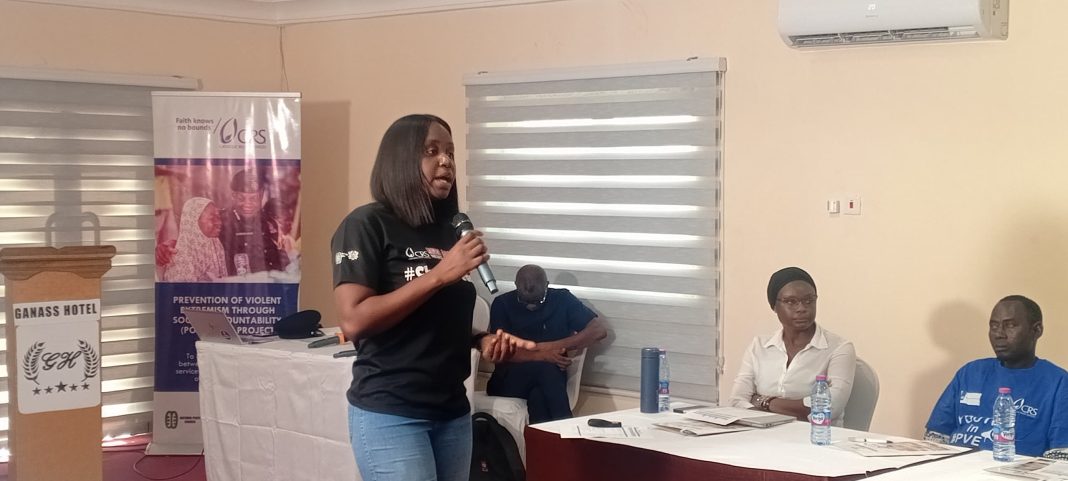Preventing violent extremism requires hearing from marginalized groups, women, youth, persons with disabilities, and minority ethnic communities—not as afterthoughts, but as essential partners in peace building, according to a project manager leading anti-extremism efforts in northern Ghana.
“You can’t talk about inclusion, you can’t talk about social inclusion without bringing together the various voices that matter,” said Adelaide Yiriyelleh, project manager for the Prevention of Violent Extremism through Social Accountability (PoVETSA) Phase II project at Catholic Relief Services Ghana.
“If you are looking at fostering any peace, well, then there’s a need to have that whole of society approach to ensure that every little voice is heard.”
Ms. Yiriyelleh was speaking at the opening of a two-day training session in Bolgatanga, where 40 carefully selected youth from various youth groups are being equipped with conflict resolution tools and prevention of violent extremism skills to deploy in their communities across the Upper East Region.
The emphasis on diversity and inclusion reflects a core principle of PoVETSA: that sustainable security cannot be built through top-down interventions alone, but requires engaging all segments of society, particularly those most vulnerable to marginalization and potential radicalization.
“Marginalized groups such as women, youth, persons with disabilities, minority ethnic groups, all have to be included when you are talking about promoting or fostering any kind of peace building,” Ms. Yiriyelleh said.
The Bolgatanga training follows a specialized session conducted in Tamale in March 2025, where 40 women were trained in preventing violent extremism and conflict resolution. “We had that training in Tamale, where we trained 40 people in March. And today we are here to also train 40 youth in the same area. So it’s a follow-up to that,” Ms. Yiriyelleh explained.
PoVETSA, funded by the Netherlands Ministry of Foreign Affairs and implemented since October 2022 by CRS in partnership with the National Peace Council and the Kofi Annan International Peacekeeping Training Centre, operates across five regions: Upper West, Upper East, North East, Northern, and Greater Accra.
“The main aim of the project is to improve civilian security relations in Ghana towards the prevention of violent extremism,” Yiriyelleh said, outlining a comprehensive strategy that addresses both immediate security concerns and underlying social factors that can fuel radicalization.
The project’s multi-faceted approach includes training participants in mediation, early warning response systems, and dialogue—”tools” that Yiriyelleh emphasized are critical for communities to detect and prevent extremist activities before they take root.
“Tools in mediation, tools in early warning response systems, tools in dialogue, just to mention a few,” she said, describing the curriculum designed to transform participants into what the project terms “agents of peace building.”
The training comes as Ghana works to inoculate its northern regions against violent extremism spreading from the Sahel, where neighboring Burkina Faso faces ongoing attacks and countries including Benin, Côte d’Ivoire, and Togo have experienced incidents. Youth unemployment has been identified as the most common driver of violent extremism in northern Ghana, making youth engagement particularly critical.
Ms. Yiriyelleh outlined ambitious expectations for the 40 participants: “After their capacities are equipped in the prevention of violent extremism and other conflict resolution tools, the expectation is that they would be agents of peace building in their respective communities and that any training, any skills acquired here today would be further stepped down in their respective communities, in their respective youth groups, and across their even other communities and family levels as well.”
To ensure accountability and measure impact, PoVETSA has established “a very robust monitoring and evaluation system” that includes quarterly monitoring visits and field visits to capture success stories and identify challenges.
“Right after this training, we have certain indicators that we are going to be measuring on,” Yiriyelleh said. “We are going to have various field visits to capture success stories, to identify any challenges that may have come up after this training, just to mention a few. And even better see how we can build up that, to build up subsequent interventions to pick up any feedback from this.”
The monitoring system allows the project to track participants’ activities against specific indicators while gathering feedback for program improvements and subsequent interventions.
Beyond youth and women’s training, PoVETSA’s comprehensive approach includes training 150 security personnel from multiple agencies—Ghana Armed Forces, Police Service, Immigration Service, National Intelligence Bureau, Fire Service, Prisons Service, and NACOC—on the “Responsibility to Protect” doctrine and human rights-based conflict management.
The project also conducts regional stakeholder dialogues to build trust between civilians and security agencies, implements empowerment programs for women recognizing their critical role in community resilience, and trains journalists on preventing violent extremism and improving media-security relationships.
PoVETSA specifically works with marginalized communities including the Fulbe and Birifoh populations, employing shuttle diplomacy missions and early warning mechanisms to address farmer-herder conflicts, political intolerance, illegal mining disputes, and other factors that can create conditions for radicalization.
The project operates on a three-level prevention strategy: addressing long-term governance, economic, and historical factors (primary prevention); providing real-time relief during crises (secondary prevention); and building post-crisis resilience and stability (tertiary prevention).
Source: a1radioonline.com|101.1Mhz|Mark Kwasi Ahumah Smith|Bolgatanga


